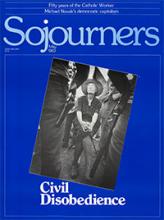Early on the morning of Ash Wednesday, 1983, people gathered in our living room overlooking the railroad tracks at the entrance to the Trident submarine base. We gathered in a quiet circle around four photographs of victims of the bombings of Hiroshima and Nagasaki. We read from the Scriptures. We placed ashes on one another's foreheads, and each of us prayed for a blessed Lent for us all.
Read the Full Article

Already a subscriber? Login
